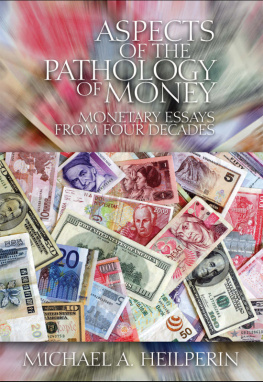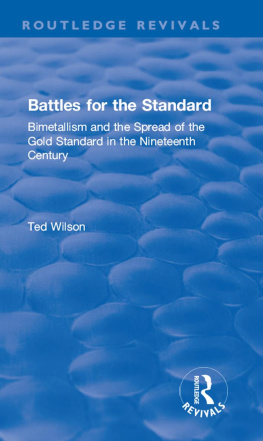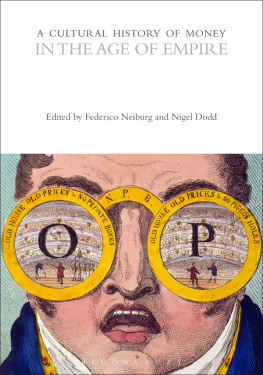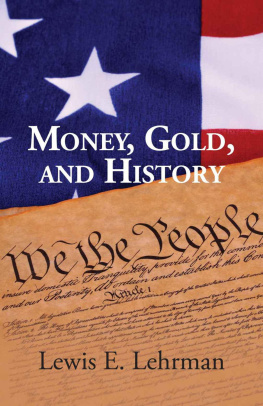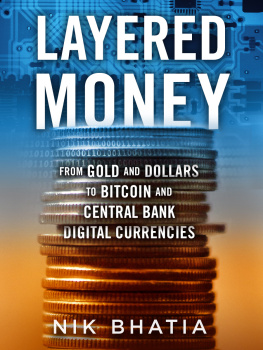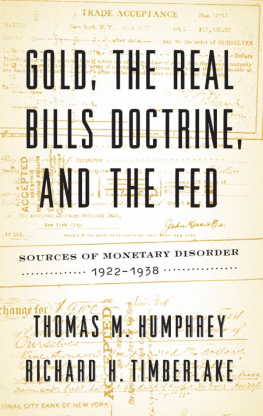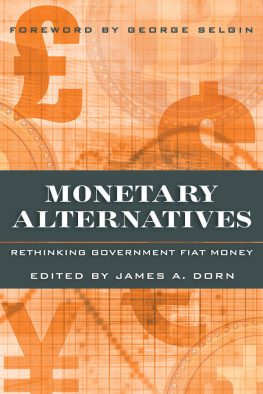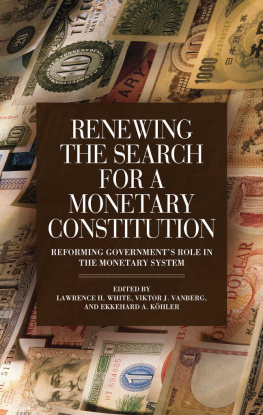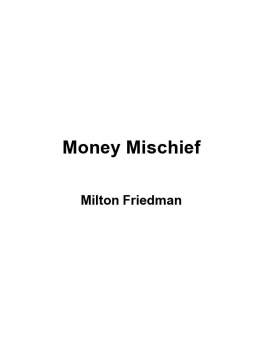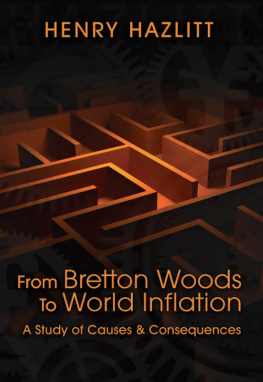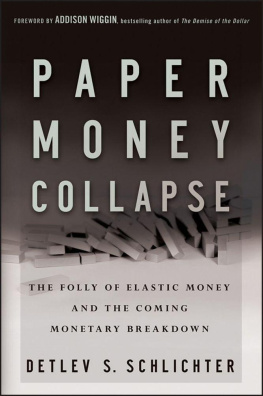Aspects of the
Pathology of Money
Monetary Essays from Four Decades
MICHAEL A. HEILPERIN
Honorary Professor at The
Graduate Institute of International Studies
Published by Michael Joseph
for the Graduate Institute of International Studies, Geneva
Ludwig von Mises Institute
Auburn, Alabama
2007

First published in Great Britain by
MICHAEL JOSEPH LIMITED
26 Bloomsbury Street
London, W.C.I.
1968
1968 by Michael A. Heilperin
Set and printed in Great Britain by
Unwin Brothers Limited at the Gresham Press, Woking,
in Imprint type, ten-point leaded, and bound by
James Burn at Esher, Surrey
To those who at various times in my career gave me the pleasure and stimulation of being my students
I hope youre a good hand at pinning and tying strings?Tweedledum remarked. Every one of these things has got to go on, somehow or other.
Alice said afterward she had never seen such a fuss made about anything in all her life... Really theyll be more like bundles of old clothes than anything else, by the time theyre ready! she said to herself.
THROUGH THE LOOKING-GLASS
With a grateful, friendly, and respectful bow to the memory of Sir Dennis Robertsonwho put this quotation on the title page of his ECONOMIC FRAGMENTS, published in 1931, at about the time I was sitting at his feet in Cambridge University as a post-doctoral student.
The Graduate Institute of International Studies was established in 1927 by Professors William E. Rappard and Paul Mantoux. Although connected with the University of Geneva, it is an autonomous foundation administered by an Executive Council.
The purpose of the Institute is to maintain in Geneva, seat of the European Office of the United Nations, of the International Labour Organization, of the World Health Organization, the European Free Trade Association, the Secretariat of the General Agreement on Tariffs and Trade and of numerous other international institutions, a centre for the study of contemporary international questions from the juridical, political, and economic points of view.
The Institute offers classes, seminars and research seminars, as well as regular lecture courses and special series of lectures.
It is intended above all for students with an academic background sufficient to enable them to undertake personal research. It prepares for the doctorate in political science, conferred by the University of Geneva, and for the Institute Diploma. The official languages are French and English.
The Institute entertains no preconceived doctrine, national or international, and it scrupulously abstains from any propaganda. It aspires to contribute to the progress of international solidarity solely by encouraging impartial observation and respect for facts and ideas.
Contents
Introduction: Four Decades of Monetary Experience
In one sense, the sub-title of this volume may appear to be misleading: the contents of the book have in fact been written between the middle thirties and the middle sixties, so that they cover a little less than thirty years. In spite of this seeming contradiction, the sub-title, for reasons set down below, seems to me to be fully justified.
Each of the four decadesthe thirties, the forties, the fifties, and the sixtieshad or has a profile all of its own. The thirties were the period when the world was painfully recovering from the Great Depression, a recovery which has remained incomplete because of the outbreak of the second world war in September 1939. The forties, although they have evidently to be subdivided into the war years and the immediate post-war period, are, from the monetary point of view, an uninterrupted era of very strict monetary controls and lacking convertibility, and of either suppressed or open inflation.
The fifties were a period of increasingly obvious recovery, both in world monetary affairs and in the economic life of individual countries. The great opportunities offered during that decade, however, for carrying out a sweeping international monetary reform have not been utilized. It should also be noted that the alleged (though never really existing) dollar shortage, which caused rivers of scholarly ink to flow for many years, has been reversed and a far more real dollar glut took its place at the end of the fifties as a result of the large balance-of-payments deficits which the U.S. started to experience in 1958.
This glut became the dominant feature of the sixties and to this day is undermining international confidence in the dollar (international confidence in the sterling having already been the victim of the second world war). The expanding flow of monetary debates, at governmental and academic levels, has failed to produce so far a workable scheme for the reform of the international monetary system. As these pages are being written, it is hard to foretell whether the sixties will ultimately go down in history as a decade ending in the worst international monetary crisis the world has known or, a much happier thought, a decade where sound statesmanship guided by wise advice succeeded in averting the crisis and in endowing the world once more, by 1970, with a soundly operational international monetary system.
Because each of these four decades has such a pronounced character of its own, the sub-title given to the present volume and the title of the Introduction both appear to be justified.
The present volume attempts to save from utter oblivion some of my more important monetary monographs and articles; it is, however, limited to material originally written in English and omits translations of certain articles originally written in Polish (before World War II) and in French (throughout my career). This is not due so much to a fear of repetition, for repetitions would have been few and easy to handle, but rather to the fact that material in English was quite sufficiently representative and abundant to fill a sizeable book. To expand it would have resulted in a second volume of comparable size. For the same reason, some of my articles published originally in English have not been included in the present collection.
My first published writings go back to 1930, i.e. precede by five years the earliest item included in the present volume. The last item included is my farewell lecture at the Graduate Institute of International Studies, delivered in Geneva on February 28, 1964. I have written a certain number of articles since, but as they belong to the continuing Grand Debate, they seemed to me to mark less of a final point in terms of thought than does the above-mentioned lecture. Accordingly none of the latest articles has been included.
The farewell lecture has been published in French in the Revue conomique et sociale, Lausanne, in October 1964. The text included here is longer and more complete than the French version which represents the lecture as delivered orally. It is one of four hitherto unpublished monographs of mine. The other three are: Post-War European Inflations, World War IA Study of Selected Cases; The International Aspects of Inflation; and Some Queries and Suggestions Concerning the Marshall Plan.
The first of these has been written during the war for one of the foundations and has been circulated rather widely in mimeographed form, but various conditions prevented its appearance in print. This foundation, which wishes to remain unknown, has none the less authorized the inclusion of this sizeable manuscript into the present volume.

